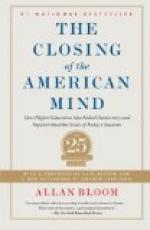Nevertheless, when one recalls the spiritual heritage of Germany: when one thinks of Herder, Schiller and Goethe; Tauler, Luther and Schleiermacher; Froebel, Herbart and Richter; Kant, Fichte and Novalis; Mozart, Beethoven and Wagner; one feels that something of the old German heritage must survive. When the German people find out what has happened to them and why, that heritage surely ought to show in some reaction against the present autocratic regime, after the War closes, if not before, perhaps even to the extent of making Germany a republic. That would be some compensation for the waste and destruction of the War. Meantime Germany stands now, ruthlessly, for the dedication of Man to the State.
One can understand why a Prussian minister forbade the teaching of Froebel’s ideas in Prussia during the latter period of the educator’s life. So one understands the hatred of Goethe because he refused allegiance to a narrow nationalism and remained cosmopolitan in his world-view. Similarly Hegel, with his justification of absolute monarchy and his theory of the German state as the acme of all spiritual evolution, was the acclaimed orthodox philosopher of Prussia, while the individualist, Schopenhauer, was neglected and despised.
One must have lived in Germany to realize the absolute control of the State over the individual—the incessant surveillance, the petty regulations, the constant interference with private life. It was to escape just this vexatious control, with the arduous militarism in which it culminates, that so vast a multitude of Germans left their native land and came to the United States—not all of whom have shown appreciation and loyalty to the free land that welcomed them.
III
THE IDEAS FOR WHICH THE ALLIED NATIONS FIGHT
In contrast to the idea for which Germany now stands, the Anglo-Saxon instinctively and tenaciously believes in the liberty and initiative of the individual. We, of course, are no longer Anglo-Saxon. When De Tocqueville in 1831 visited our country, surveyed our institutions and, after returning home, made his trenchant diagnosis of our democracy, he could justly designate us Anglo-Americans. That time is past; we are to-day everything and nothing: a great nation in the womb of time, struggling to be born.
Nevertheless, Anglo-American ideas still dominate and inspire our civilization. It is, indeed, remarkable to what an extent this is true, in the face of the mingling of heterogeneous races in our population. As English is our speech, so Anglo-American ideas are still the soul of our life and institutions.




